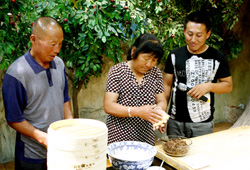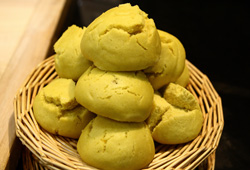|
 |
 |
|
PRESENTATION: Wu Guizhen (middle) demonstrates the bun-making process on June 20 (JIANG XIAOYING) |
LOCAL DELICACY: The millet buns made by Huang Guosheng and Wu Guizhen (JIANG XIAOYING) |
When watching the buns clip, Jia found out the couple's home was only a half-day drive from his hometown. To make his idea a reality, Jia and friends reached their cave home in early June, and presented his idea of potential cooperation — send cooks here for skill learning, and then sell the buns in Beijing, the country's capital city, some 780 km away. Jia also invited the couple to go to Beijing for sightseeing and a closer look at his restaurants.
The couple was moved by Jia's sincerity, but wanted to talk to their children first. Both junior Huangs live in Yulin City, some 100 km away. Daughter Huang Yanxia, 35, runs a restaurant, and son Huang Yanxiong, 30, is a truck driver.
On his way to Yulin, Jia left a message on his Weibo page, a Twitter-like microblogging site, saying "The Huang couple is homely, honest and lovely. I have made up my mind in inviting them to come to Beijing, offering them a platform to make a better life. In the meantime, more people could enjoy their original buns." He also posted the picture he took with the couple in front of their home.
To his astonishment, the message had been reposted for 311 times and received 145 comments in a short time. Some praised his good sense of marketing; others doubted about his intention and labeled him a dishonest businessman.
"I felt bad when reading those negative comments," Jia noted. "But I insisted in inviting them to come to Beijing."
The Huang family returned home after their very first tour to Beijing. Jia gave them 10 days to reconsider potential cooperation.
Finally, the couple signed a three-year contract worth 300,000 yuan ($47,244) with Jia's company, endorsing the restaurant-made millet buns and coaching cooks in other branch restaurants in the skills to make them.
Authentic flavor?
According to the contract, the restaurant-made bun, sold at 3 yuan ($0.47) each, will hit the market in August. On the one hand, the cooperation between individual local cooks and a chain restaurant could offer more food options; on the other hand, however, it also triggers worries for the flavor — without a natural environment such as stone mill and cave home, will the bun taste as authentic as the couple made it at home?
"We bought a machine made in Japan which was similar to the traditional stone mill. We will buy the most natural materials from Huang's hometown, too," Jia noted. "We will try our best to keep the flavor unchanged."
Cui Xiaoyan, bakery supervisor of the company's research and development center, was the couple's first apprentice. With a 15-year-long career, Cui was confident in learning the bun-making skill.
"The key to the bun-making is the move. It is also important to not make the dough too hard or too soft," Cui said. "Practice makes perfect. I would ask them for guidance if I had any problems."
The primary task for training, according to Cui, was to make criteria for the recipe with the couple's approval as soon as possible. Thus, some 100 cooks would follow the written guidance to make buns in over 50 restaurants nationwide.
Besides marketing and coaching, Jia said their potential cooperation might also include applying for a registered trademark for the bun.
According to Huang Yanxiong, his parents would build a new and bigger cave home at the bottom of the hill in their hometown so that the family could live together. He also planned to open a bun booth with his wife to help his parents.
"We don't have time to take care of the fields and livestock back home as we are now in Beijing," Wu said. "Beijing is fine. But our home is better." | 